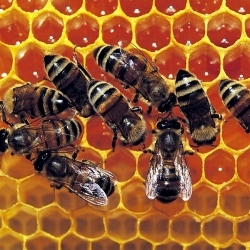
Bees resort to biting when faced with pests, such as parasitic mites, that are too small to sting. Close study of the biting behaviour has revealed that they secrete a chemical in their bite that stuns pests so they are easier to eject from a colony.
Tests suggest the chemical could also have a role in human medicine, as a local anaesthetic. Dr Alexandros Papachristoforou, a biologist at Greece’s Aristotle University of Thessaloniki told the BBC honey-bees had previously been seen dealing with pests that lived alongside them in colonies but this had always thought to be part of their grooming behaviour.
"Everybody thought that was it. Full stop," Dr Papachristoforou said. "But that’s not the case. It’s something totally different and was just there and we could not see it. "I think we know too many things about the pathology of honey bees," he said. "We are still missing a lot of basic knowledge on their biology and behaviour." The pests that honey-bees bite include varroa mites as well as wax moth larvae.
The varroa mite is endemic throughout both feral and cultivated honey-bee colonies. If the population of mites in a hive is left unchecked they can sap the strength of workers, making them much more susceptible to viruses, disease and other debilitating conditions.
